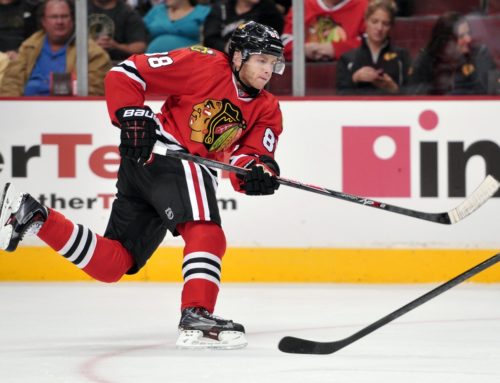Trading Timeshares
Dobber Sports
2009-11-25

Real estate timeshares are questionable things. The concept was born in Europe many decades ago and it seemed to have its heyday in the United States during the 1980s. Then the idea got mired in shady marketing and the unscrupulous desire to make a quick buck, but at its heart, the concept was fairly sound. Can't afford the whole thing? Just buy part of it.
Maybe this idea could work for you in your fantasy hockey league.
In a nutshell, here's the concept: trading players for unequal amounts of time. For example, you and I could agree to a trade. I send you Joe Thornton today (November 25th) for the rest of the season, and you give me Alex Ovechkin…but not until December 25th. Ovechkin on my fantasy hockey team? Now that sounds like something I might want to find in my stocking come Christmas morning.
Quantifying Players
As fantasy GMs we love considering information, we love mulling (obsessing) over details, and we certainly love finding new ways to look smart and claim victory. Ah, sweet, sweet victory.
So we often go to pain-staking lengths to assess the quality of the players in any proposed transaction in the hope of accurately forecasting future performance.
Returning to our example, let's throw some numbers around. Thornton finished the 2008-09 campaign with 86 points, while Ovechkin finished with 110 points. Thornton is currently on pace for a much improved 105 point season, while Ovechkin is on pace for 115 points.
And yes, there are so many other factors to consider when forecasting future fantasy performance, but in this example we're going to keep things simple for sake of clarity.
In addition to the quality of player, savvy GMs should also consider quantity in as far as injuries will affect performance. Is Ovechkin's shoulder going to become a nagging issue? Certainly no one trades for Marian Gaborik thinking that he will play 100% of the remaining games available (unless perhaps you're doing the deal in April).
Back to timesharing…by introducing this concept as a variable, the quantity aspect to any player becomes another factor that can be used to bargain with, and hopefully by which to gain an advantage. With the possibility of unequal quantities being exchanged, there is now a whole new perspective to be considered by GMs when trades are proposed.
Will Thornton score more points in four-and-a-half months than Ovechkin will in three-and-a-half? Maybe. It probably depends on which months we're comparing.
Last year, Thornton scored 63 points between November 25th and the end of the season, while Ovechkin scored 64 points between December 25th and the end of the season.
So if we made our hypothetical trade this time last year, the numbers look pretty close at first glance, but don't forget that you still have Ovechkin until December 24th. In that time period, Ovechkin put up an amazing 21 points. So the point spread is actually 64 to 84. Not so equal now. Except that I, of course, could have picked up an additional man to replace the hole that Thornton left in my roster until Ovechkin arrived. Centre is a pretty deep position, so how many of those 20 points might I have recovered from the waiver wire?
The numbers become even closer when you start considering trades involving players who can't put up 20 points in a month. When Ovechkin is firing on all cylinders he is positively scary as we all know.
And yet Thornton's having an improved season, so maybe the numbers would work out differently this year.
But the point (so to speak) is well made, many players run hot and cold and trading unequal quantities of a player's season is another way GMs can look to getting mileage out of these hot streaks.
Overall then it seems pretty clear that incorporating the idea of trading unequal portions of a player's season would add complexity to any fantasy hockey experience and would allow GMs a new avenue to vie for dominance.
Concerns, Complications, and Complaints
Beyond any concerns over complexity, there are a few other frightening aspects to this idea of trading unequal playing time.
The first type of concern likely to be raised is the traditionalist complaint: they don't do it in the NHL, so we shouldn't do it in fantasy hockey. Fair enough, but any argument based on mirroring the NHL has to acknowledge that most of our leagues don't do many things the way they do them in the real world. When was the last time you worried about conforming to the current salary cap? And yes, I recognize that some fantasy leagues do have caps, but most of us don't bother with them.
In addition to flying in the face of the accepted status quo, there are also practical concerns. Yahoo isn't currently set up for trades that aren't simultaneous (although I'm sure they could quickly change that…are you paying attention Yahoo?). That means that if I accept this type of trade and send you a player today, I'd better hope that you're a GM of your word, otherwise the integrity of the entire league might be jeopardized. And you don't even have to be devious to be dangerous. What if you get bored, or consequently decide that fantasy hockey isn't your thing and walk away from the league before the back half of transaction is done? While die-hard leagues are likely self-regulated well enough to avoid problems like this, there could be cause for concern in more casual leagues.
Your Thoughts?
Creativity is a good thing, even in a conservative game like hockey.
Number Four forever changed the way defencemen play the game, the butterfly technique has moulded an entire generation of goaltenders, and each new collective bargaining agreement adopted by the NHL and NHLPA leads to new victories claimed through creativity (usually by player agents).
Certainly we poolies can do the same. Certainly we're bright enough to analyze a new idea and decide if it's useful or not.
The idea of trading unequal quantities of players' season is one that has likely occurred to others before me, but I haven't been able to find anything online or in conversation, either opinions or experiences. Maybe it's new to you, or maybe it's not. Regardless, I'd love to hear your opinion on the idea of player timeshares, if only to satisfy my own curiosity.
The concept of timeshares has a pretty spotty record when it comes to real estate, but maybe the idea could open up a new dimension in fantasy hockey.
At least there are no hidden closing fees or taxes.





 FLA
FLA EDM
EDM NYR
NYR CGY
CGY MIN
MIN S.J
S.J ANA
ANA SEA
SEA STL
STL
